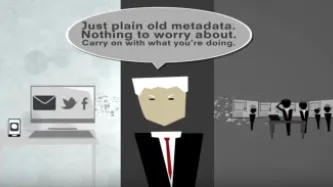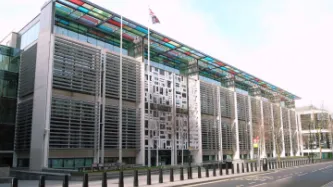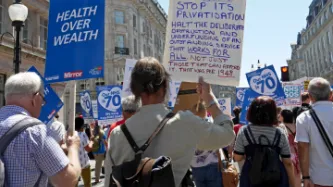Search
Content type: Examples
After the British government announced a national lockdown, Derbyshire Police used drones to capture footage of people rambling, walking their dogs, and taking photos in the Peak District. The move was widely criticised as heavy-handed and counter-productive; however, the government followed up by saying that people should stay near their homes for exercise and not travel unnecessarily and granting police new powers to enforce the lockdown.
Source: https://www.bbc.co.uk/news/uk-england-…
Content type: Examples
The Local Government Association has argued that councils should not have to comply with freedom of information requests during the coronavirus crisis. Greater Manchester police followed suit, saying that police in non-critical roles were being reallocated to operational policing and would not answer FOI requests "until further notice".
Source:
https://www.theguardian.com/politics/live/2020/mar/23/uk-coronavirus-live-news-latest-boris-johnson-minister-condemns-people-ignoring-two-metre-…
Content type: Examples
On March 14 a group of immigrant advocacy groups wrote to the government asking for the Home Office to release all 1,500 to 2,000 detainees in order to protect them from a coronavirus outbreak in the UK's seven removal centres and two short-term holding centres.. On March 21, the Home Office said it had released 300 of the detainees. The charity Detention Action launched a legal action to compel the Home Office to release the most vulnerable detainees and test all detainees. The Home Office…
Content type: Examples
Researchers at the University of Oxford are working with the UK government on an app similar to the smartphone tracking system China developed to alert people who have come in contact with someone infected with the coronavirus. The British app, which would be associated with the country's National Health Service,, would rely on the public volunteering to share their location data out of a sense of civic duty rather than, as in China, compulsion. The service would not publish the movements of…
Content type: Examples
UK: O2 shares aggregated location data with government to test compliance with distancing guidelines
Mobile network operator O2 is providing aggregated data to the UK government to analyse anonymous smartphone location data in order to show people are following the country's social distancing guidelines, particularly in London, which to date accounts for about 40% of the UK's confirmed cases and 30% of deaths. The project is not designed to monitor individuals. Lessons from the impact on London of travel restrictions could then be applied in the rest of the country. The government says it has…
Content type: Examples
BT, owner of UK mobile operator EE, is in talks with the government about using its phone location and usage data to monitor whether coronavirus limitation measures such as asking the public to stay at home are working. The information EE supplies would be delayed by 12 to 24 hours, and would provide the ability to create movement maps that show patterns. The data could also feed into health services' decisions, and make it possible to send health alerts to the public in specific locations.…
Content type: News & Analysis
In the last few days, PI and its Network have been recording and documenting the measures being proposed by various governments, international institutions and companies to help contain the spread of Covid-19.
In a recent development, the Guardian have reported that the UK government is the latest to seek to use mobile phone location and other traffic data from telecommunication operators to help with measures the government may develop next as part of the response to Covid-19.
It comes…
Content type: Examples
The coronavirus action plan announced on March 3, alongside many measures for managing the NHS in the crisis, will also allow the Investigatory Powers Commissioner to appoint judicial commissioners (JCs) on a temporary basis in the event that there are insufficient JCs available to operate the system under the Investigatory Powers Act 2016. The Home Secretary, at the request of the Investigatory Powers Commissioner, will also be allowed to vary the time allowed for urgent warrants to be…
Content type: Examples
A new surveillance system to detect cases of COVID-19 in England was established by Public Health England (PHE) and the NHS to strengthen existing systems and to prepare for and prevent wider transmission of the virus. Some NHS hospitals have been asked to take part in the plan, which involves testing samples from patients with severe respiratory infections who do not meet the current definition for COVID-19 in intensive care units (ICU) and Severe Respiratory Failure (ECMO) Centres. …
Content type: Case Study
Every one of us has an expectation to be legally protected in the same way, to have access to the same human rights, and to be able to defend those rights in court.
However, for trans and non-binary people, this has not always been the case – and in many places around the world it still isn’t the case. The lack of legal recognition for their gender has had significant consequences.
If the law does not recognise you as the person that you are and treats you as someone you are not then you…
Content type: News & Analysis
Today Advocate General (AG) Campos Sánchez-Bordona of the Court of Justice of the European Union (CJEU), issued his opinions (C-623/17, C-511/18 and C-512/18 and C-520/18) on how he believes the Court should rule on vital questions relating to the conditions under which security and intelligence agencies in the UK, France and Belgium could have access to communications data retained by telecommunications providers.
The AG addressed two major questions:
(1) When states seek to impose…
Content type: Press release
Today the Advocate General (AG) of the Court of Justice of the European Union (CJEU), Campos Sánchez-Bordona, issued his opinion on how he believes the Court should rule on vital questions relating to the conditions under which security and intelligence agencies in the UK, France and Belgium could have access to communications data retained by telecommunications providers.
The AG advises the following:
The UK’s collection of bulk communications data violates EU law.
The French and Belgium…
Content type: News & Analysis
*Photo by Michelle Ding on Unsplash
Pat Finucane was killed in Belfast in 1989. As he and his family ate Sunday dinner, loyalist paramilitaries broke in and shot Pat, a high profile solicitor, in front of his wife and children.
The Report of the Patrick Finucane Review in 2012 expressed “significant doubt as to whether Patrick Finucane would have been murdered by the UDA [Ulster Defence Association] had it not been for the different strands of involvement by the…
Content type: Long Read
*Photo by Kristina Flour on Unsplash
The British government needs to provide assurances that MI5’s secret policy does not authorise people to commit serious human rights violations or cover up of such crimes
Privacy International, along Reprieve, the Committee on the Administration of Justice, and the Pat Finucane Centre, is challenging the secret policy of MI5 to authorise or enable its so called “agents” (not MI5 officials) to commit crimes here in the UK.
So far we have discovered…
Content type: Press release
Privacy International, Open Rights Group, the Institute for Strategic Dialogue, Fair Vote, Who Targets Me? and Demos have today written to all the main UK political parties, demanding that they are transparent with the public about how they are using voters’ personal data in their electioneering. Twitter's announcement yesterday of their ban on political advertising is just the latest wake up call to politicians about the risks to democracy of personal data driven microtargeting of political…
Content type: Examples
In February 2019, the UK Home Office told the Independent Chief of Borders and Immigration that it was planning to build a system that could check and confirm an individual's immigration status in real time to outside organisation such as employers, landlords, and health and benefits services. Lawyers and human rights campaigners expressed concerns that the project had received no scrutiny or public discussion, and that the Home Office's record suggested the result would be to unfairly lock…
Content type: Examples
In January 2019 the UK Home Office announced it would collaborate with France to overhaul its regime for suspicious activity reports in order to fight money laundering. In 2018, the number of SARs filed with the National Crime Agency rose by 10% to nearly 464,000. Banks, financial services, lawyers, accountants, and estate agents are all obliged to file SARs if they suspect a person or organisation is involved in money laundering, terrorist finance, or other suspicious activity. The system has…
Content type: Examples
In 2018, the UK Department of Education began collecting data for the schools census, a collection of children's data recorded in the national pupil database and including details such as age, address, and academic achievements. The DfE had collected data on 6 million English children when, in June 2018, opposition led the department to halt the project, which critics said was an attempt to turn schools into internal border checkpoints. In January 2019, however, in an answer to a Parliamentary…
Content type: Examples
In September 2018, at least five local English councils had developed or implemented a predictive analytics system incorporating the data of at least 377,000 people with the intention of preventing child abuse. Advocates of these systems argue that they help councils struggling under budget cuts to better target their limited resources. The Hackney and Thurrock councils contracted the private company Xantura to develop a predictive model for them; Newham and Bristol have developed their own…
Content type: Examples
In October 2018, in response to questions from a committee of MPs, the UK-based Student Loans Company defended its practice of using "public" sources such as Facebook posts and other social media activity as part of the process of approving loans. In one case earlier in the year, a student was told that a parent's £70 Christmas present meant the student did not qualify for a maintenance loan without means testing because it meant the student was not estranged from their family. SLC insisted…
Content type: Examples
In November 2018 the UK's Equality and Human Rights Commission warned that asylum seekers have been deterred from seeking medical help in Scotland and Wales since the UK government began forcing the English NHS to charge upfront in 2017 and by fears that medical personnel will comply with Home Office orders to forward their data. The commission, along with health charities and the Labour and LibDem political parties, called for the policy to be suspended. The Home Office policy of moving asylum…
Content type: Examples
The Home Office Christmas 2018 announcement of the post-Brexit registration scheme for EU citizens resident in the UK included the note that the data applicants supplied might be shared with other public and private organisations "in the UK and overseas". Basing the refusal on Section 31 of the Freedom of Information Act, the Home Office refused to answer The3Million's FOI request for the identity of those organisations. A clause in the Data Protection Act 2018 exempts the Home Office from…
Content type: Examples
In December 2018, a report, "Access to Cash", written by the former financial ombusdsman Natalie Ceeney and independent from but paid for by the cash machine network operator Link, warned that the UK was at risk of sleepwalking into a cashless society and needed to protect an estimated 8 million people (17% of the British population) who would become disadvantaged as a result. Although cash used halved between 2007 and 2017, and debit cards passed cash in share of retail transactions in 2017,…
Content type: Examples
In October 2018, British home secretary Sajid Javid apologised to more than 400 migrants, who included Gurkha soldiers and Afghans who had worked for the British armed forces, who were forced to provide DNA samples when applying to live and work in the UK. DNA samples are sometimes provided by applicants to prove their relationship to someone already in the UK, but are not supposed to be mandatory. An internal review indicated that more people than the initially estimated 449 had received DNA…
Content type: Examples
In a report released in December 2018, the UK's National Audit Office examined the management of information and immigrant casework at the Home Office that led to the refusal of services, detention, and removal of Commonwealth citizens who came to the UK and were granted indefinite leave to remain between 1948 and 1973, the so-called "Windrush generation" but never given documentation to prove their status. The NAO concludes that the Home Office failed to adequately consider its duty of care in…
Content type: Examples
In November 2016 the UK Information Commissioner's Office issued an enforcement notice against London's Metropolitan Police, finding that there had been multiple and serious breaches of data protection law in the organisation's use of the Gangs Violence Matrix, which it had operated since 2012. The ICO documented failures of oversight and coherent guidance, and an absence of basic data protection practices such as encryption and agreements covering data sharing. Individuals whose details are…
Content type: News & Analysis
Privacy International has joined over 30 organisations working with migrants and refugees to write to the newly appointed British Home Secretary to raise a number of pressing issues, which require action if the immigration and asylum system is to regain the trust of the public.
The letter below was sent to the Home Secretary on Wednesday, 30 July 2019.
Find out more about PI’s work to demand a more humane approach to immigration based on the principles of fairness, accessibility, and respect…
Content type: Examples
On 14 May 2018, the husband of the victim, a pharmacist living in Linthorpe in Middlesbrough, subdued his wife with insulin injection before straggling her. He then ransacked the house to make it appear as a burglary. The data recorded by the health app on the murder’s phone, showed him racing around the house as he staged the burglary, running up and down the stairs. The victim’s app showed that she remained still after her death apart from a movement of 14 paces when her husband moved her…
Content type: News & Analysis
In July 2019, the UK House of Commons' Science and Technology Committee published a report on Digital Government. Lying not so subtlely amongst it's recommendations is this: "The Government should facilitate a national debate on single unique identifiers for citizens to use for accessing public services along with the right of the citizen to know exactly what the Government is doing with their data."
It's been pointed out that this is basically some of the worst features of an ID card…
Content type: News & Analysis
Today, the British Health Secretary Matt Hancock announced a partnership between the NHS and Amazon to use the NHS’s website content as the source for the answer given to medical question, such as “Alexa, how do I treat a migraine?”
While we welcome Amazon’s use of a trusted source of information for medical queries, we are however extremely concerned about the nature and the implications of this partnership. Amazon is a company with a worrying track record when it comes to the way they…











